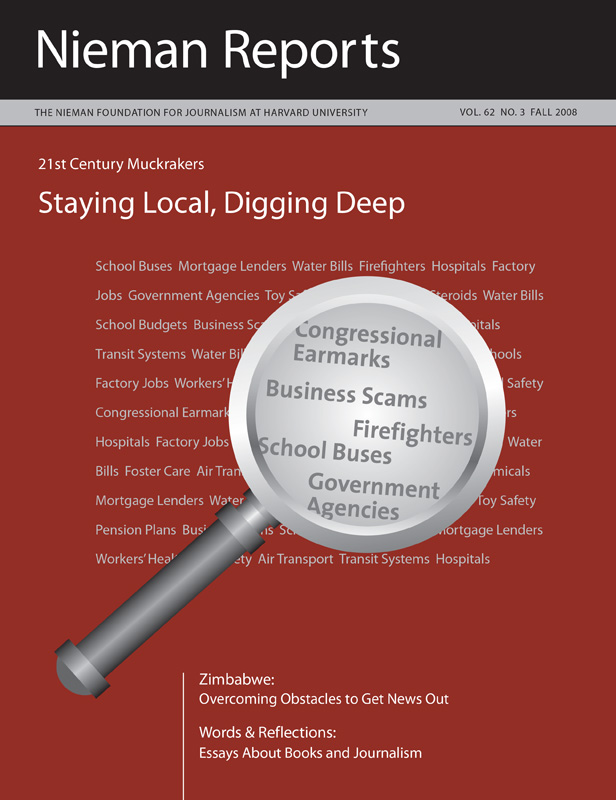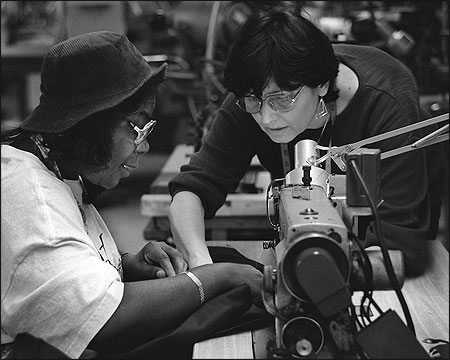
21st Century Muckrakers: Staying Local, Digging Deep
On this point, editors, reporters and newspaper readers agree. In a time of cutbacks and a shrinking news hole, at a moment when print is in peril and digital is dominant, watchdog and investigative reporting must remain at the core of journalism’s mission. In this third part of our 21st Century Muckrakers project, editors and reporters speak to how metro and regional newspapers are confronting the enormous challenges of today and offer clues to where this kind of reporting will likely be headed tomorrow.

When The Miami Herald published a series exposing corruption in the local housing agency in 2006, hundreds of citizens stormed county meetings and marched in Miami’s poorest neighborhoods. Enraged over the newspaper’s findings, readers contacted the state attorney’s office demanding arrests of developers who pocketed millions but failed to build promised homes.
“The housing agency was supposed to be their lifeline, and it failed to come through,” said reporter Debbie Cenziper, after receiving the 2007 Pulitzer Prize for Local Reporting for the series, “House of Lies.”
That same year, the newspaper published two other major projects, “Predators Among Us,” which revealed breakdowns in Florida’s treatment of sexual offenders, and “Deadly Express,” an exposé of the hidden dangers of air cargo carriers across the United States.
While the stories prompted reforms and, in some cases, arrests, they also presented a new challenge to newsroom leaders: How can a newspaper with a rich tradition of local watchdog reporting continue that work in an era of dwindling staff and diminishing resources? On another level, who is going to do this kind of work in a community where corruption runs so deep?

Moving to a Different Model
With staff turnover taking away some of our top reporters (a 17 percent staff cut in June) and a hiring squeeze during the past year, The Miami Herald has been determined to continue to launch ambitious projects, even with fewer full-time I-team members. To do so, we have turned to a different model than having a member of the I-team fly solo or with other team members.
For projects, the newspaper now typically links a lead investigative reporter with beat reporters. This enables us to keep several projects on track each year while allowing younger reporters to get the kind of training they may have waited years to acquire. It more fully invests those beat reporters into their turf, giving them time to spend exposing serious issues that normally get shorter shrift in their daily reporting.
In 2007, the Herald launched three projects. Two landed in the newspaper last year, and a third was published this summer—all with remarkable impact. For each assignment, we paired an I-team member with a reporter (or reporters) who knew the beat related to the project’s topic. As work on the story took place so, too, did mentoring in the skills and challenges of this type of long-term reporting.
The first investigation examined the Miami-Dade Empowerment Trust, the area’s largest antipoverty agency, by investigative reporter Jason Grotto and metro reporter Rob Barry. While Grotto found the agency failed to vet a troubled biotech park project that cost taxpayers millions, Barry determined that despite millions spent to create jobs, the poverty rate in Miami was actually increasing.
RELATED WEB LINK
"Poverty Peddlers"
— miamiherald.comThe result of this combined effort—“Poverty Peddlers”—led to the arrest of a prominent developer and the shutdown of the biotech project. For other articles in this series, metro reporter Scott Hiaasen joined with Grotto for a deeper dive into the Empowerment Trust; he set out to examine the agency’s programs since 2000 and probed its job creation program. In doing so, he turned up information demonstrating that the trust fabricated job numbers while continuing to receive federal dollars. The reporters also found a small cadre of developers—insiders with deep ties to the county’s most powerful political figures—were siphoning millions in public dollars from projects without delivering any services. Additionally, they found the antipoverty agency had spent tens of thousands of dollars flying celebrities to town for the MTV Video Music Awards and funding expensive junkets for agency board members.
In working as partners on this project, each reporter utilized his particular strength. Grotto, who’d been a computer-assisted reporter, worked the numbers while Hiaasen mined familiar ground from his years covering local government. Their effort resulted in a shared byline on four of the “Poverty Peddlers” seven stories—articles that stirred outrage, prompted a second criminal investigation, and the recovery of millions in tax dollars. The county has since overhauled the antipoverty program.
This experience proved invaluable for Hiaasen, who now leads projects while assigned to the paper’s I-team. In the course of his career, he had worked on some serious enterprise stories, but this project truly tested him. “There was so much information to work with,” he said. “It would have been easy to get overwhelmed.” Hiaasen said Grotto was able to teach him how to better organize his information in computer files and, through long rounds of editing, he gradually picked up on the more declarative style of projects writing.
Teaming Up to Cover Corruption
The newspaper also teams up veteran editors with metro reporters on short-term investigations. Herald Urban Affairs Editor Ronnie Greene, a former I-team member who reported the “Deadly Express” series, directed coverage of an explosive issue in the city of Miami involving a once-secret memo written by one city commissioner relaying allegations that another commissioner was demanding kickbacks for political allies. The Herald successfully sued to get the memo and, once obtained, broke ground on several major tentacles of what’s now a prosecutor’s corruption probe. Hiaasen and city hall reporter Michael Vasquez joined in an examination of the ties between the commissioner accused in the memo and her most ardent allies, who had been hired as lobbyists by city vendors.
After the city and county approved an unprecedented three billion dollar megaplan that would build everything from a new baseball stadium to a new port tunnel, Greene led beat reporters on a four-part series, breaking apart each piece of the project and serving as a mentor during the reporting. As a former county reporter, Greene was able to keep reporters focused on several key issues, including influence peddling and lobbying. “This is Miami. You follow the money,” he kept on reminding them—and he showed them how to do it.
Overall, every reporter in the Herald’s newsroom is encouraged to carry out watchdog journalism and, from these journalists, the newspaper develops its next generation of I-team members. From the experience working with Cenziper on the housing series, beat reporter Larry Lebowitz is now steeped in his own investigation on the county’s transit authority. Investigative reporter Jack Dolan was teamed with business reporter Matt Haggman and Rob Barry for an investigation published in July that showed Florida regulators allowed thousands of ex-convicts to peddle mortgages in the state—with many going on to steal millions from borrowers.
Rarely does the newspaper hire a projects writer from the outside; rather, editors develop them from within the ranks. By teaming our investigative staff with beat reporters, we are, naturally, training the next crop. The strategy will allow us to persevere in our newspaper’s core mission—relentless digging on local issues—even as the industry changes around us.
Michael Sallah is investigations editor and reporter at The Miami Herald. He was co-recipient of the 2004 Pulitzer Prize for Investigative Reporting for the Toledo Blade and directed The Miami Herald investigation that won the 2007 Pulitzer Prize for Local Reporting.